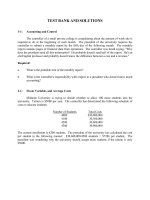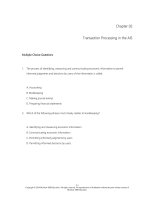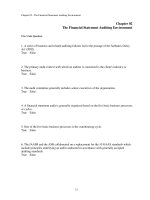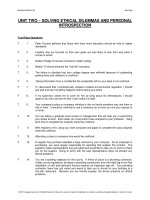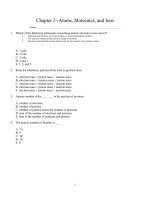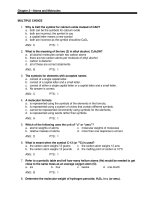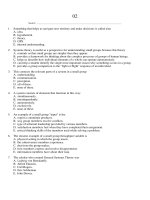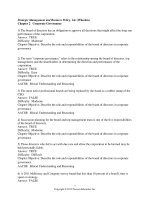Supervision concepts and skill building 8th edition certo test bank
Bạn đang xem bản rút gọn của tài liệu. Xem và tải ngay bản đầy đủ của tài liệu tại đây (175.3 KB, 17 trang )
Chapter 02 - Ensuring High Quality and Productivity
Chapter 02 Ensuring High Quality and Productivity
Multiple Choice
[QUESTION]
1. Productivity is best defined as the:
A. success rate of the efforts to prevent defects in a firm’s goods or services.
B. amount of results an organization gets for a given amount of inputs.
C. statistical representation of the effectiveness of a quality control method.
D. organization-wide focus on satisfying lifelong customers.
Answer: B
Page: 32
Difficulty: Easy
[QUESTION]
2. Poor quality work is most likely to lead to:
A. reduced recalls.
B. high profits.
C. low costs.
D. loss of revenues.
Answer: D
Page: 33
Difficulty: Medium
[QUESTION]
3. Quality control is best defined as the company’s efforts to:
A. prevent or correct defects in its goods or services or to improve them in some way.
B. produce goods that are of the same quality as the competitor’s goods.
C. control all whistle-blowing activities so as to maintain the positive image of the company.
D. let employees know that they will be penalized for any complaints related to the quality of
their goods or services.
Answer: A
Page: 34
Difficulty: Easy
[QUESTION]
4. When a city’s park district considers ways to upgrade its playground equipment or
improve the programs it offers senior citizens, it is focusing on:
A. concurrent control.
B. process control.
C. method control.
D. product quality control.
Answer: D
2-1
© 2013 by McGraw-Hill Education. This is proprietary material solely for authorized instructor use. Not authorized for sale or distribution in any
manner. This document may not be copied, scanned, duplicated, forwarded, distributed, or posted on a website, in whole or part.
Chapter 02 - Ensuring High Quality and Productivity
Page: 35
Difficulty: Medium
[QUESTION]
5. Process control is best defined as the quality control method that emphasizes:
A. how to do things in a way that leads to better quality.
B. how to improve the product itself.
C. ways to improve the service itself.
D. the use of sampling techniques to find defects in products.
Answer: A
Page: 35
Difficulty: Easy
[QUESTION]
6. Statistical quality control primarily involves:
A. maintaining a customer feedback log and making the necessary improvements in products
whenever required.
B. checking each and every product for possible defects so as to reduce high costs related to poor
quality.
C. looking for defects in parts, finished goods, or other outcomes selected through a sampling
technique.
D. monitoring production quality on an ongoing basis and making corrections whenever the
results show that the process is out of control.
Answer: C
Page: 37
Difficulty: Easy
[QUESTION]
7. The most accurate way to apply statistical quality control is to use a:
A. specific sample.
B. random sample.
C. quota sample.
D. stratified sample.
Answer: B
Page: 37
Difficulty: Medium
[QUESTION]
8. An operator who periodically measures some aspect of ongoing production and plots the
results on a control chart is most likely using:
A. statistical quality control.
B. statistical process control.
C. the zero-defects approach.
D. the just in time approach.
Answer: B
2-2
© 2013 by McGraw-Hill Education. This is proprietary material solely for authorized instructor use. Not authorized for sale or distribution in any
manner. This document may not be copied, scanned, duplicated, forwarded, distributed, or posted on a website, in whole or part.
Chapter 02 - Ensuring High Quality and Productivity
Page: 37
Difficulty: Medium
[QUESTION]
9. The zero-defects approach is best defined as the quality control technique:
A. designed to improve the product or service output to 99.97 percent perfect.
B. where an organization works toward making its goods and services free of problems.
C. in which the employees look for defects in parts, finished goods, or other outcomes selected
through a sampling technique.
D. in which the top performer of a process is identified and imitated.
Answer: B
Page: 38
Difficulty: Easy
[QUESTION]
10. Which of the following is most likely to be the first step the members of an employee
involvement team would take?
A. Select the problems to focus on first
B. Identify quality problems related to the employees’ areas of responsibility
C. Analyze the problem to identify the causes of poor quality
D. Identify possible solutions and select one to recommend to management
Answer: B
Page: 39
Difficulty: Medium
[QUESTION]
11. Employee involvement teams are most successful when:
A. a strict hierarchical structure is maintained.
B. supervisors make it mandatory for all employees to join the group.
C. all the group members are eager to participate.
D. the supervisor follows the essay appraisal method.
Answer: C
Page: 40
Difficulty: Difficult
[QUESTION]
12. Six Sigma is best defined as a:
A. process-oriented quality control method designed to improve the operations output to 99.9997
percent perfect.
B. process-oriented quality control method aimed at producing goods with zero percent defect.
C. product-oriented quality control method designed to reduce errors to 99.9997 percent perfect.
D. product-oriented quality control method aimed at producing goods with zero percent defect.
Answer: A
Page: 40
Difficulty: Easy
2-3
© 2013 by McGraw-Hill Education. This is proprietary material solely for authorized instructor use. Not authorized for sale or distribution in any
manner. This document may not be copied, scanned, duplicated, forwarded, distributed, or posted on a website, in whole or part.
Chapter 02 - Ensuring High Quality and Productivity
[QUESTION]
13. The primary objective of total quality management (TQM) is to:
A. meet or exceed customer expectations.
B. maximize profits for the company and the employees.
C. form a sustainable organization.
D. protect the employees from any form of discrimination.
Answer: A
Page: 41
Difficulty: Medium
[QUESTION]
14. Joseph M. Juran, one of the experts who played an important role in spreading the idea of
TQM, taught quality concepts to the Japanese. He emphasized the view that management should
seek to maintain and improve quality through efforts on two levels: the organization as a whole
and the:
A. department primarily formed to improve product quality.
B. human resource department of the organization.
C. most productive departments in the organization.
D. individual departments in the organization.
Answer: D
Page: 41
Difficulty: Medium
[QUESTION]
15. Which of the following is an annual award administered by the U.S. Department of
Commerce and given to the company that shows the highest quality performance in seven
categories—leadership; strategic planning; customer and market focus; measurement, analysis,
and knowledge management; human resource focus; process management; and results?
A. Firestone Inner Circle of Quality Award
B. Malcolm Baldrige National Quality Award
C. ISO 9000 certification
D. Golden Peacock Award
Answer: B
Page: 43
Difficulty: Easy
[QUESTION]
16. Which of the following is a series of standards adopted by the International Organization for
Standardization to spell out acceptable criteria for quality systems?
A. ISO 9000
B. Total quality management guidelines
C. Malcolm Baldrige guidelines
D. Benchmarking
Answer: A
Page: 44
2-4
© 2013 by McGraw-Hill Education. This is proprietary material solely for authorized instructor use. Not authorized for sale or distribution in any
manner. This document may not be copied, scanned, duplicated, forwarded, distributed, or posted on a website, in whole or part.
Chapter 02 - Ensuring High Quality and Productivity
Difficulty: Easy
[QUESTION]
17. The practice of identifying the top performer of a process, then learning and carrying out the
top performer’s practices is called:
A. diversity training.
B. free riding.
C. total quality management.
D. benchmarking.
Answer: D
Page: 44
Difficulty: Easy
[QUESTION]
18. The superstore supervised by Joanne had such high retail sales for the year that the company
president decided to identify her store as the “premier store” for comparisons, not only in terms
of gross sales, but also for efficiency in all areas of operations. This practice of determining the
quality standards by measuring against the top performer of a particular process is popularly
known as:
A. product control.
B. benchmarking.
C. free riding.
D. performance appraisal.
Answer: B
Page: 44
Difficulty: Medium
[QUESTION]
19. Quality improvement directed toward value ideally begins when the:
A. supervisor makes decisions aimed at balancing present needs against the needs of future
generations.
B. organization starts to recruit more people with sustainable skills.
C. organization’s employees communicate with customers to determine their needs and wants.
D. organization sets up departments according to the goods or services produced.
Answer: C
Page: 44
Difficulty: Medium
[QUESTION]
20. The most effective way supervisors can overcome the productivity constraint of management
limitations is by:
A. collaborating with the labor union to build a sustainable organization.
B. demonstrating by their actions and words that they are interested in the department’s
productivity.
C. facilitating the formation of informal groups among the members of the production team.
2-5
© 2013 by McGraw-Hill Education. This is proprietary material solely for authorized instructor use. Not authorized for sale or distribution in any
manner. This document may not be copied, scanned, duplicated, forwarded, distributed, or posted on a website, in whole or part.
Chapter 02 - Ensuring High Quality and Productivity
D. encouraging the employees to overcome their resistance to change and adapt to new
technologies.
Answer: B
Page: 47
Difficulty: Medium
[QUESTION]
21. Mary processes 96 permit applications in an eight-hour day at the secretary of state’s office.
If Mary earns $6 per hour, what would be her productivity measure?
A. 2
B. 6
C. 16
D. 48
Answer: A
Page: 49
Difficulty: Medium
[QUESTION]
22. Productivity is most likely to improve the most when the:
A. process quality is improved upon so that employees work more efficiently.
B. organization’s managers decide to put the defective products up for sale.
C. output of a department or an organization increases along with the increase in cost.
D. organization adheres strictly to the EEOC guidelines.
Answer: A
Page: 51
Difficulty: Medium
[QUESTION]
23. Before a supervisor can make decisions about how to trim costs, he/she has to know where
the money is going. The most accurate source of such information is a(n):
A. employee handbook.
B. code of ethics.
C. budget report.
D. vision statement.
Answer: C
Page: 52
Difficulty: Easy
[QUESTION]
24. Increasing output without increasing costs is likely to make employees:
A. reduce the time they spend in detour behavior.
B. unhappy that they are asked to work harder without additional pay.
C. reject the principles of job enlargement and job enrichment.
D. readily adopt the principles of job enlargement and job enrichment.
Answer: B
2-6
© 2013 by McGraw-Hill Education. This is proprietary material solely for authorized instructor use. Not authorized for sale or distribution in any
manner. This document may not be copied, scanned, duplicated, forwarded, distributed, or posted on a website, in whole or part.
Chapter 02 - Ensuring High Quality and Productivity
Page: 52
Difficulty: Difficult
[QUESTION]
25. A supervisor who wants to boost productivity by increasing output must ideally:
A. ensure that the new output goals are set very high even at the cost of being unachievable.
B. emphasize the positive aspects of the change.
C. exclude employees from the decision-making process.
D. dictate the decisions to his team.
Answer: B
Page: 53
Difficulty: Easy
[QUESTION]
26. Expenses not related directly to producing goods and services are popularly referred to as:
A. staff salaries.
B. overhead.
C. core costs.
D. fixed costs.
Answer: B
Page: 53
Difficulty: Easy
[QUESTION]
27. Which of the following is an accurate example of an overhead?
A. Cost of company cafeteria
B. Cost of instruments needed for production
C. Basic salary paid to every employee
D. Amount spent on raw materials for production
Answer: A
Page: 53
Difficulty: Medium
[QUESTION]
28. Downtime is best defined as the time during which:
A. employees or machines are not producing goods or services.
B. employees or machines are maximizing their production of goods or services.
C. the output of a department increases along with an increase in cost.
D. the output of a department decreases along with a decrease in cost.
Answer: A
Page: 54
Difficulty: Easy
2-7
© 2013 by McGraw-Hill Education. This is proprietary material solely for authorized instructor use. Not authorized for sale or distribution in any
manner. This document may not be copied, scanned, duplicated, forwarded, distributed, or posted on a website, in whole or part.
Chapter 02 - Ensuring High Quality and Productivity
[QUESTION]
29. All kinds of tactics used for postponing or avoiding work that results in wasted time are
referred to as:
A. detour behavior.
B. nepotism.
C. narcissism.
D. free riding.
Answer: A
Page: 55
Difficulty: Easy
[QUESTION]
30. Which of the following is true in the context of regulating departmental work flow?
A. If the work flow must remain even, a supervisor must hire temporary employees during peak
periods.
B. When a definite plan is charted out, it hampers the flexibility of the employees and makes it
difficult to regulate departmental work flow.
C. A supervisor should ideally avoid working closely with his/her manager and peers in order to
effectively regulate departmental work flow.
D. The formation of teams of employees to examine and solve work-flow problems helps in
effectively regulating departmental workflow.
Answer: D
Page: 55
Difficulty: Medium
[QUESTION]
31. Foodie, a fast food joint, offers home delivery service. It realizes that the purchase of a few
motorcycles would make the service more efficient. The estimated cost of purchase is set at
$100,000 and it is expected to save $20,000 per year. In this case, the payback period would be:
A. 6 years
B. 5 years
C. 3 years
D. 2 years
Answer: B
Page: 56
Difficulty: Easy
[QUESTION]
32. A percentage that represents the average annual earnings for each dollar of a given
investment is referred to as the:
A. average downtime.
B. average rate of return.
C. average idle time.
D. total payback period.
Answer: B
2-8
© 2013 by McGraw-Hill Education. This is proprietary material solely for authorized instructor use. Not authorized for sale or distribution in any
manner. This document may not be copied, scanned, duplicated, forwarded, distributed, or posted on a website, in whole or part.
Chapter 02 - Ensuring High Quality and Productivity
Page: 56
Difficulty: Easy
[QUESTION]
33. Which of the following is most likely to be the primary cause underlying the problem of time
lost due to tardiness and absenteeism?
A. Frequent layoffs
B. Lack of motivation
C. Increased costs
D. Reduction of overhead
Answer: B
Page: 57
Difficulty: Easy
[QUESTION]
34. High turnover is most likely to:
A. save the company from unnecessary expenses.
B. motivate employees to increase productivity.
C. prove expensive for the company.
D. attract qualified employees.
Answer: C
Page: 58
Difficulty: Medium
[QUESTION]
35. When a supervisor gives information about productivity improvement, employees should:
A. have an opportunity to ask questions.
B. be discouraged from expressing their views.
C. interrupt at every step to show their involvement in the process.
D. simply follow the instructions without questioning the supervisor as this would lead to loss of
time.
Answer: A
Page: 59
Difficulty: Medium
True/False
[QUESTION]
36. An organization with a poor reputation has a harder time recruiting superior employees.
Answer: True
Page: 33
Difficulty: Easy
2-9
© 2013 by McGraw-Hill Education. This is proprietary material solely for authorized instructor use. Not authorized for sale or distribution in any
manner. This document may not be copied, scanned, duplicated, forwarded, distributed, or posted on a website, in whole or part.
Chapter 02 - Ensuring High Quality and Productivity
[QUESTION]
37. Poor-quality work always leads to low costs.
Answer: False
Page: 33
Difficulty: Medium
[QUESTION]
38. Attracting new customers costs less than keeping existing customers satisfied.
Answer: False
Page: 33
Difficulty: Medium
[QUESTION]
39. Product quality control specifically emphasizes how to do things in a way that leads to better
quality.
Answer: False
Page: 34
Difficulty: Medium
[QUESTION]
40. Supervisors need to remember that a quality control technique itself does not guarantee high
quality.
Answer: True
Page: 36
Difficulty: Easy
[QUESTION]
41. In the context of the zero-defects approach, top managers alone are responsible for ensuring
that the company goods and services are free of problems.
Answer: False
Page: 38
Difficulty: Medium
[QUESTION]
42. After identifying quality problems, a typical employee involvement team selects the
problems to focus on first.
Answer: True
Page: 39
Difficulty: Medium
[QUESTION]
43. To ensure the success of employee involvement teams, membership should ideally be made
mandatory.
Answer: False
Page: 40
2-10
© 2013 by McGraw-Hill Education. This is proprietary material solely for authorized instructor use. Not authorized for sale or distribution in any
manner. This document may not be copied, scanned, duplicated, forwarded, distributed, or posted on a website, in whole or part.
Chapter 02 - Ensuring High Quality and Productivity
Difficulty: Medium
[QUESTION]
44. Six Sigma is best defined as the process in which an organization-wide focus is placed on
satisfying customers by continuously improving every business process.
Answer: False
Page: 40
Difficulty: Medium
[QUESTION]
45. The basic idea of TQM is to use statistics to monitor production quality during the
production process.
Answer: False
Page: 41
Difficulty: Medium
[QUESTION]
46. TQM efforts address the processes used for delivering goods and services, not just the
products themselves.
Answer: True
Page: 42
Difficulty: Medium
[QUESTION]
47. Benchmarking is a process-oriented quality control method designed specifically to reduce
errors to 99.9997 percent perfect.
Answer: False
Page: 44
Difficulty: Medium
[QUESTION]
48. Quality improvement practices should be directed toward delivering greater customer value.
Answer: True
Page: 44
Difficulty: Easy
[QUESTION]
49. Standards of quality control should be written, measurable, clear, specific, and challenging
but achievable.
Answer: True
Page: 45
Difficulty: Easy
2-11
© 2013 by McGraw-Hill Education. This is proprietary material solely for authorized instructor use. Not authorized for sale or distribution in any
manner. This document may not be copied, scanned, duplicated, forwarded, distributed, or posted on a website, in whole or part.
Chapter 02 - Ensuring High Quality and Productivity
[QUESTION]
50. When the productivity of organizations in a country improves, the people of the country are
forced to buy goods and services at higher prices.
Answer: False
Page: 46
Difficulty: Medium
[QUESTION]
51. Operative employees will contribute to improve productivity only if they believe
management is truly committed to this objective.
Answer: True
Page: 47
Difficulty: Easy
[QUESTION]
52. To ensure superior quality of goods, supervisors should take all the decisions related to
improving productivity and avoid involving employees in the process.
Answer: False
Page: 47
Difficulty: Easy
[QUESTION]
53. Improving productivity involves changing employee attitudes and skills.
Answer: True
Page: 48
Difficulty: Easy
[QUESTION]
54. When government regulations seem illogical or unreasonable, an organization cannot be
penalized for ignoring or disobeying them.
Answer: False
Page: 48
Difficulty: Medium
[QUESTION]
55. Union contracts do not typically specify what tasks particular employees may do, what hours
they may work, and how organizations may use employees.
Answer: False
Page: 48
Difficulty: Medium
[QUESTION]
56. The basic way to measure productivity is to divide inputs by outputs.
Answer: False
Page: 49
2-12
© 2013 by McGraw-Hill Education. This is proprietary material solely for authorized instructor use. Not authorized for sale or distribution in any
manner. This document may not be copied, scanned, duplicated, forwarded, distributed, or posted on a website, in whole or part.
Chapter 02 - Ensuring High Quality and Productivity
Difficulty: Easy
[QUESTION]
57. To increase productivity, a supervisor needs to either increase outputs or reduce inputs, but
not both.
Answer: False
Page: 49
Difficulty: Medium
[QUESTION]
58. Improving process quality improves productivity.
Answer: True
Page: 51
Difficulty: Easy
[QUESTION]
59. All the quality-control strategies are mutually exclusive.
Answer: False
Page: 51
Difficulty: Easy
[QUESTION]
60. In deciding which strategies to use, supervisors should consider which will appeal to higherlevel management.
Answer: True
Page: 51
Difficulty: Easy
[QUESTION]
61. Typically, the productivity of a department increases with the increase in overhead allocated
to each department.
Answer: False
Page: 53
Difficulty: Easy
[QUESTION]
62. Downtime is the time during which employees or machines are most productive.
Answer: False
Page: 54
Difficulty: Easy
2-13
© 2013 by McGraw-Hill Education. This is proprietary material solely for authorized instructor use. Not authorized for sale or distribution in any
manner. This document may not be copied, scanned, duplicated, forwarded, distributed, or posted on a website, in whole or part.
Chapter 02 - Ensuring High Quality and Productivity
[QUESTION]
63. Idle time refers to the tactics for postponing or avoiding work.
Answer: False
Page: 55
Difficulty: Medium
[QUESTION]
64. When work levels are low, the result is downtime.
Answer: True
Page: 55
Difficulty: Easy
[QUESTION]
65. A supervisor may find it helpful to work with his or her manager and peers or form teams of
employees to examine and solve work-flow problems.
Answer: True
Page: 55
Difficulty: Easy
[QUESTION]
66. Lack of motivation is often the problem underlying time lost to tardiness and absenteeism.
Answer: True
Page: 57
Difficulty: Medium
[QUESTION]
67. Absenteeism is often the first step leading to low turnover.
Answer: False
Page: 58
Difficulty: Medium
[QUESTION]
68. Low turnover is expensive for any company.
Answer: False
Page: 58
Difficulty: Medium
[QUESTION]
69. When managers start talking about improving productivity, employees initially react with
relief.
Answer: False
Page: 58
Difficulty: Medium
2-14
© 2013 by McGraw-Hill Education. This is proprietary material solely for authorized instructor use. Not authorized for sale or distribution in any
manner. This document may not be copied, scanned, duplicated, forwarded, distributed, or posted on a website, in whole or part.
Chapter 02 - Ensuring High Quality and Productivity
[QUESTION]
70. Employees are fearful of productivity improvements due to possible layoffs.
Answer: True
Page: 58
Difficulty: Medium
Essay
[QUESTION]
71. What is productivity? Mention three activities that are directed toward improving quality and
productivity.
Answer: Productivity is the amount of results (output) an organization gets for a given amount of
inputs. Thus, productivity can refer to the amount of acceptable work employees do for each
dollar they earn or the number of acceptable products manufactured with a given amount of
resources. Many of the supervisor’s activities, including planning, leading, and controlling, are
directed toward improving quality and productivity.
Page: 32
Difficulty: Medium
[QUESTION]
72. What is quality control? Which two areas do supervisors focus on when they look for highquality performance to reinforce or improvements to make? Describe each.
Answer: Quality control refers to an organization’s efforts to prevent or correct defects in its
goods or services or to improve them in some way. In general, when supervisors look for highquality performance to reinforce or improvements to make, they can focus on two areas: the
product itself or the process of making and delivering the product. An organization that focuses
on ways to improve the product itself is using product quality control. An organization might
also consider how to do things in a way that leads to better quality. This focus is called process
control.
Page: 34-35
Difficulty: Medium
[QUESTION]
73. Discuss the zero-defects approach and total quality management (TQM).
Answer: The zero-defects approach is a quality-control technique based on the view that
everyone in the organization should work toward the goal of delivering such high quality that all
aspects of the organization’s goods and services are free of problems. Total quality management
(TQM) is an organization-wide focus on satisfying customers by continuously improving every
business process for delivering goods or services.
Page: 38, 41
Difficulty: Medium
2-15
© 2013 by McGraw-Hill Education. This is proprietary material solely for authorized instructor use. Not authorized for sale or distribution in any
manner. This document may not be copied, scanned, duplicated, forwarded, distributed, or posted on a website, in whole or part.
Chapter 02 - Ensuring High Quality and Productivity
[QUESTION]
74. Define “value” and describe how a full-service commercial bank could improve customer
value.
Answer: Value refers to the worth a customer places on a total package of goods and services
relative to its cost. Possible ways in which a commercial bank can improve customer value
include: maintaining an efficient and prompt customer care service; providing ATMs at
convenient locations; maintaining longer customer hours with some weekend hours; offering
quicker responses to loan requests; and offering lower loan and credit card interest rates.
Page: 44
Difficulty: Medium
[QUESTION]
75. List three constraints on productivity. Elaborate one of the limitations and discuss how it can
be overcome.
Answer: Students answers may vary.
Some of the constraints on productivity are management limitations, employee attitudes and
skills, union rules, and government regulations.
Management limitations: Too often, employees believe that management is more interested in
the next quarter’s profits than in producing high-quality goods or services as efficiently as
possible. Employees become frustrated, especially when managers seem to ignore their ideas.
The most important way supervisors can overcome this constraint is to set a good example.
Supervisors should demonstrate by their actions and words that they are interested in the
department’s productivity. This behavior includes seeing that the job is done right the first time,
as well as using resources wisely, which, on a personal level, includes being well organized.
Supervisors also must communicate instructions clearly and plan carefully so that employees are
able to live up to managers’ expectations. Furthermore, supervisors should listen to employees’
concerns and ideas about improving productivity.
Page: 47
Difficulty: Medium
[QUESTION]
76. You are the supervisor of two employees who process loan applications. Employee A can
process 36 applications in a six-hour day, whereas Employee B can process 40 applications in an
eight-hour day. Calculate their productivity in terms of applications processed per hour. Which
employee is more productive and why?
Answer: Employee A = 6 apps/hour (36/6); Employee B = 5 apps/hour (40/8). Employee A is
more productive than Employee B, since he/she can process six applications/hour compared to
Employee B’s productivity of five applications/hour.
Page: 49
Difficulty: Difficult
2-16
© 2013 by McGraw-Hill Education. This is proprietary material solely for authorized instructor use. Not authorized for sale or distribution in any
manner. This document may not be copied, scanned, duplicated, forwarded, distributed, or posted on a website, in whole or part.
Chapter 02 - Ensuring High Quality and Productivity
[QUESTION]
77. What are the different ways of improving productivity?
Answer: Productivity improves when the department or organization can do as much work at a
lower cost and when output rises without a cost increase. Another way to improve productivity is
to improve process quality so that employees work more efficiently and do not have to spend
time correcting mistakes or defects. Maintenance of good quality is also closely related to
productivity. Poor quality can slow the output of both individuals and the firm as a whole. For
that reason, one of the supervisor’s most important tasks is to think of and implement ways to get
the job done right the first time. Some of the primary methods for improving process and product
quality are Six Sigma, zero defects, and employee involvement.
Page: 51
Difficulty: Medium
[QUESTION]
78. List five measures aimed at cost-control that a supervisor can employ.
Answer: Students answers may vary.
A few measures aimed at cost-control that a supervisor can employ include; using budgets;
increasing output; improving methods; reducing overhead; minimizing waste; regulating
workflow; installing modern equipment; training and motivating employees; and minimizing
tardiness, absenteeism, and turnover.
Page: 52
Difficulty: Easy
[QUESTION]
79. Discuss how a supervisor can effectively regulate departmental workflow.
Answer: A supervisor can take several steps to regulate departmental work flow. A supervisor
should first make sure that adequate planning has been done for the work required. A supervisor
may also find it helpful to work with his or her manager and peers or form teams of employees to
examine and solve work-flow problems. Cooperation can help make the work flow more evenly
or at least more predictably. If the work flow must remain uneven, a supervisor may find that the
best course is to use temporary employees during peak periods, an approach that can work if the
temporary employees have the right skills.
Page: 55-56
Difficulty: Medium
[QUESTION]
80. What is turnover? How does it affect organizations?
Answer: The rate at which employees leave an organization is known as turnover. High turnover
is expensive, because the organization must spend a lot of money to recruit and train new
employees. Therefore, an important part of controlling costs is to keep good employees by
making the organization a place they want to stay.
Page: 58
Difficulty: Medium
2-17
© 2013 by McGraw-Hill Education. This is proprietary material solely for authorized instructor use. Not authorized for sale or distribution in any
manner. This document may not be copied, scanned, duplicated, forwarded, distributed, or posted on a website, in whole or part.
